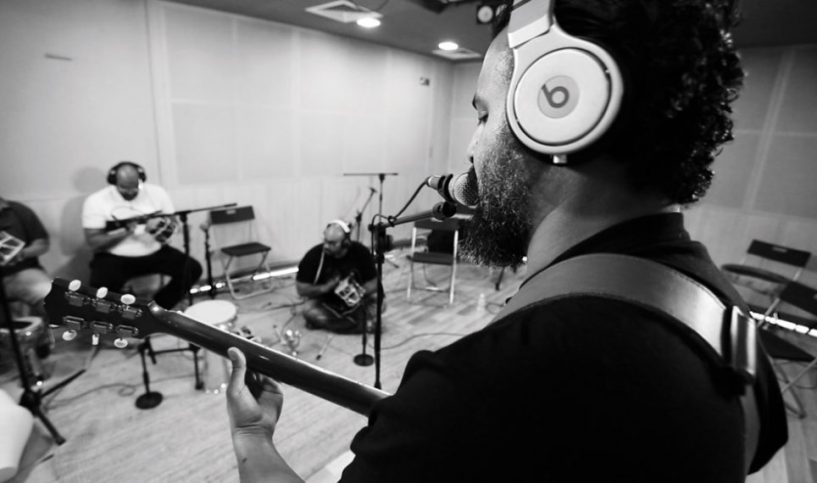“It’s fun, it’s festive and when it is sad it’s like the blues,” is how musician and ethnomusicologist Ghazi Al-Mulaifi describes Kuwaiti music.
Ghazi, Assistant Professor at the Department of Music at The Public Authority for Applied Education and Training, is also the band leader and composer of the world Jazz Ensemble Ghazi Al-Mulaifi Quartet.
The music boom experienced by Kuwait in the last few years does not surprise him with more opportunities for young Kuwaiti musicians to play live and a renewed interest in the bahri (sea music) of the pearl divers.
“It is because we are waking up from a cultural amnesia that has been imposed upon us by external influences,” he says. “We are a musical people who love to move and sing.”
For Ghazi, the grandson of one of the last Kuwaiti pearl divers, Abdulaziz Abdullah Al Mulaifi, it is the bahri music as a dialogue with modern styles that could be a key to a unique genre of contemporary Kuwaiti music that captures the true spirit of the country – outward looking, diverse, adventurous.
“I was very close to my grandfather –he was a master pearl diver and a nokhada (captain of a pearling ship) and speaking about the sea was something he never did. It was too painful for him,” he says. ”He made really incredible sacrifices and I benefited from all those sacrifices just by pure luck. So what is this thing we are trying to forget. I understand when it comes to my grandfather’s generation and beyond. They wanted to forget the pain. But I think it is also our role not to forget their pain.”
For Ghazi the line between his work as a musician and ethnomusicologist, is beginning to blur. He describes himself as an applied ethnomusicologist.
“Music embodies memory and emotion. And to revive the spirit of dialogue in Kuwaiti music goes beyond creating interesting music. I want to do that for sure – but I also want to show the world that the story of Kuwait is not just about oil, it is about engagement and exchange. Music becomes this very strong, salient example of all of those things. It’s about not wasting the potential of this awesome history that gave us this great music.“
In 2012, his passion to do homage to his grandfather led him together with his friend, photographer Mike Krueger, to join a pearl diving trip lead by the Nadi Al Bahri (Kuwait’s Sea Sport Club) where 100 boys embarked on sea expedition and trained to become pearl divers as their elders would have. This involved learning to perform the traditional pearl diving songs.
On the trip Ghazi met Abdulaziz Al-Hemely, the ship’s nahaam. The Nahaam stands in front of the crew, chanting melodically to positively channel the crew’s energies and help dissipate the hardships at sea. The crew collectively hums as a response to his call.
“Their role was to sing songs that instructed the divers to perform a task (raise a sail, raise an anchor, row the boat etc.). But also, the role of the nahaam was spiritual in nature. He would keep a sense of unity and spiritual balance among the weary sailors,” says Ghazi.
Al-Hemely, who has also captained the Sea Club’s pearl diving expeditions, leads the Mayouf Mejally Folkloric Ensemble of seven percussionists of traditional Kuwaiti instruments including twaysat (hand cymbals), tiran (framed drums), yihala (clay pot), tabl bahri (large sea drum) and mirwas (hand held double sided drum).
“Abdulaziz and his percussion ensemble are really the living archive of Kuwaiti Bahri music. The music has been passed down to them orally and corporeally and within the space of a Diwaniya, generationally. They are like the keepers of this past,” Ghazi says. To his delight, Al-Hemely’s ensemble was very interested in creating a musical dialogue between traditional and modern styles.
“Kuwaiti sea music was occasioned by trade and exchange with other civilizations, ranging from Zanzibar to Sri Lanka and everywhere in between along the trade routes. In fact there is a beat in Zanzibar right now called Kuwaiti beats,” he says. The sangini beat in Kuwaiti music was bought back by the Nahaam Bin Hussein.
“From his ship he would hear this rhythm over and over again coming from Hindu places of worship. And he bought some these instruments he heard back to Kuwait.” Ghazi says.
It is this give and take between musicians where Ghazi sees parallels between Kuwaiti music and jazz. “It is an improvisatory musical tradition that continuously reinterprets melody and motif (like Kuwaiti music used to do much more),” he says. “We have become stuck. I want to unstuck our music.”
I ask him why so many young Kuwaiti musicians seem to draw their inspiration from Western music genres and sing in English rather than exploring their own musical heritage. “I think it is because as Kuwaitis we don’t have an intimate relationship with our old music. And it is funny because our old music is really not that old – I am talking before 1980, “ he says.
Ghazi is involved in a project to archive and record traditional Kuwaiti music, but warns against music being turned into a museum piece. He also feels the role women played historically in traditional music has been ignored.
“When Kuwaiti music started being presented as a piece of heritage production it ceased to be a dialogic force, and some people were excluded – like women’s music. A lot of the heritage music we celebrate today is men’s music and at the most that is only half the story,” he says. “When I think about the memory of my great grandfather, their survival was based on engaging with other people and learning other languages and marrying other cultures. We have always been a mixed people but we live in a time where neo-tribalism is a kind of willful amnesia.”
Ghazi himself played and toured extensively with bands in the US. “I have no problem with this pull to Western music. For me to play Western music symbolized freedom and room to breathe. I am not sure if that is necessary today because there is a lot more room to breathe.”
He says there are young bands like the psychedelic rock band Galaxy Juice that is catching what he calls “the bug” to find ways to fuse old traditional styles to Western music styles.
He says his dream is to dissolve the dichotomy between people playing shaabi (popular, local music) and people playing Western music.
His project Ghazi Al-Mulaifi Quartet fuses Khaleeji beats, Jazz, Rock, and Sawt (popular Kuwaiti music genre). The other members are all recognized musicians in the Kuwaiti scene – Yousef Yaseen, Adel Al-Qattan and Abdulaziz Al-Hemely.
“They are all from families with deep ties to the sea, and Kuwait sea music,” Ghazi says.
Ghazi hopes to collaborate with Kuwaiti female musicians too. “Let us bring Kuwaiti women’s music back in the spotlight,” he says. He is optimistic that as long as Kuwait continues to have space to create art, music and have concerts the future of the Kuwaiti music scene looks bright and will put Kuwait back on the map as a musical center in the Gulf.
Because? “Our beats swing,” he concludes.
Visit Ghazi’s website for more information at: www.ghazimusic.com and follow him on Instagram @ghazimusic for the latest updates!











